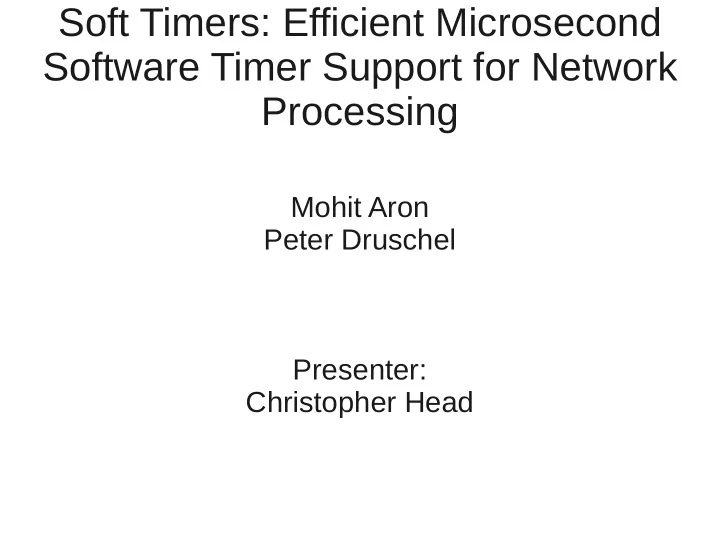

Soft Timers: Efficient Microsecond Software Timer Support for Network Processing Mohit Aron Peter Druschel Presenter: Christopher Head
Problem: Network Bandwidth ● Bandwidth: 1Gbps ● MTU: 1518B ● Rate: ~82000 pps ● Period: ~12µs ~= 36000instructions@3GHz ● Overhead of protection domain switch for interrupt handling too large!
Solution: Interrupt Thresholds ● Program NIC to interrupt on every n received packets for n >1 ● Problems: ● Latency increased ● Stream stops suddenly? Packets stuck in NIC? ● Receive burstiness increases burstiness of transmit in reactive protocols (e.g. TCP) ● Not supported by all NICs
Solution: Interrupts+Polling ● Disable interrupts when too much activity and poll instead ● Linux NAPI ● Problems: ● When to poll? Latency increased ● Only useful on receive
Better: Soft Timers ● Disable interrupts when too much activity and poll instead ● Poll at very low time intervals, but probabilistically ● Avoid interrupt overhead altogether by polling only when already interrupted
Algorithm Traditional Soft Timer Interrupt Scheduled Interrupt Time Useful Work Scheduled Event Interrupt Processing Time Saved/Added
Performance ● Overhead for null event from 0.8µs to immeasurably small ● Overhead with cache/TLB-polluting event every 10µs from 5.1µs to 3.5µs ● Almost always very close to desired trigger time: mean triggers at ~2–30µs despite 1000µs hardware tick
Improvement: Cheap Timer ● APIC timer characteristics: ● Adding event cheap (register access) ● Firing event expensive (interrupt → context switch) ● Idea: ● Add often: establish cap on timer period ● Fire rarely: normally use soft timer; APIC fires only if soft timer too slow
Questions ● Is it effective in handling a lot of packets? ● Yes: allows userspace to keep working even under heavy load ● Receiving a lot of packets is useless if application can't run to deal with them! ● Can it be used for disk access as well? ● NAPI/Polling Idea: OK to drop received packets under heavy load if it helps userspace keep running ● Disk: not OK to drop IO requests! ● Disk requests often synchronous
Questions ● Have soft timers been implemented for real? ● Linux: not exactly, but some aspects are: – Network NAPI: polling (better than interrupts, not as good as soft timers (?)) – Tickless system: APIC idea: use hardware timer to schedule next event at high resolution rather than periodic ticks at low resolution ● Hard real time semantics? ● APIC enhancement: set deadline for real time deadline, target for earliest time event can be handled
Questions ● What if system load is low? ● Soft timers handled by an idle CPU all the time ● Switch NIC to interrupt mode if load is low (e.g. Linux NAPI) ● Dynamically adjust hardware timer rate to keep soft timers responsive? ● APIC enhancement: guarantees deadline met ● Authors' claim: apps making few syscalls are not doing heavy network IO – Shared machines?
Questions ● Why are cache/TLB pollution minimized? ● Code to enter or leave interrupt context executed once instead of twice ● Given variability over 1ms, are soft timers still useful? ● APIC enhancement ● CPUs are very fast; is it still worthwhile? ● Long pipelines: context switches very expensive
Questions ● POSIX defines timers to ns granularity; how are these implemented today? ● Hardware timers ● Nanosecond resolution is not provided ● Linux Tickless System: like the APIC idea – High resolution with infrequent firings
Questions ● Why isn't this done today? The old way still works? ● Linux/NAPI: Polling – Not exactly the same as soft timers – Same goal: prevent livelock where kernel spends 100% of time handling interrupts and 0% in userspace getting useful work done ● Network utilization – NOT very good today – Networks must be very over-provisioned to avoid catastrophic chronic throughput breakdown
Questions ● Multicore: just throw a core an interrupt handling instead ● Web servers are embarrassingly parallel ● Soft timers cost nothing ● Why waste CPU time, even if you have a lot?
Recommend
More recommend